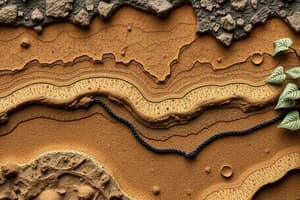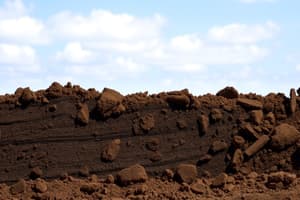Podcast
Questions and Answers
Which of these options are fundamental materials of soil? (Select all that apply)
Which of these options are fundamental materials of soil? (Select all that apply)
- Water
- Organics (correct)
- Clay (correct)
- Sand (correct)
- Gravel (correct)
What are granular soil types?
What are granular soil types?
Gravel/crushed rock, cannot be excavated with vertical side slopes.
What are cohesive soil types?
What are cohesive soil types?
High clay content, can be excavated with vertical side slopes.
What are the soil classification systems mentioned?
What are the soil classification systems mentioned?
Coarse-grained soil is defined as soil where less than 50% by weight passes through a No. 200 sieve.
Coarse-grained soil is defined as soil where less than 50% by weight passes through a No. 200 sieve.
Fine-grained soil is defined as soil where more than 50% by weight passes through a No. 200 sieve.
Fine-grained soil is defined as soil where more than 50% by weight passes through a No. 200 sieve.
What defines Type A soil?
What defines Type A soil?
What defines Type C soil?
What defines Type C soil?
What is a visual soil test?
What is a visual soil test?
What is a manual soil test?
What is a manual soil test?
What does 'in-situ' refer to in soil terms?
What does 'in-situ' refer to in soil terms?
What is organic matter in soil?
What is organic matter in soil?
What is consolidation in soil terms?
What is consolidation in soil terms?
What does Young's Modulus measure?
What does Young's Modulus measure?
A triaxial test is a soil strength test.
A triaxial test is a soil strength test.
Which of the following is true about undisturbed soil samples?
Which of the following is true about undisturbed soil samples?
Soil percolation tests provide information about soil settlement.
Soil percolation tests provide information about soil settlement.
What is the unit of measurement for soil strength?
What is the unit of measurement for soil strength?
Flashcards are hidden until you start studying
Study Notes
Fundamental Soil Materials
- Soil consists mainly of gravel, sand, silt, clay, and organic materials.
Soil Types
- Granular soils include gravel and crushed rock; cannot be excavated with vertical side slopes.
- Cohesive soils, which have high clay content, can be excavated with vertical side slopes.
Soil Classification Systems
- Key systems include USCS, AASHTO, OSHA, USDA, and Modified Burmister classification system.
Grain Size Classification
- Coarse-grained soil: less than 50% by weight passes through a No. 200 sieve.
- Fine-grained soil: more than 50% by weight passes through a No. 200 sieve.
Soil Types by Unconfined Compression Strength
- Type A: cohesive soil with a strength of 1.5 tsf or greater.
- Type B: cohesive soils between 0.5 and 1.5 tsf, includes granular cohesionless soils and dry unstable rock.
- Type C: soils with strength less than 0.5 tsf; includes very weak cohesive and granular soils, submerged soils, or excavations for leaking pipes.
Soil Testing Methods
- Visual soil tests involve analyzing grain size, fissures, disturbance, layering, water presence, and vibration.
- Manual soil tests include plasticity tests, dry strength tests, thumb penetration tests, pocket penetrometers, and shear vanes.
Soil Conditions
- Loose soil conditions indicate excavated or loaded material, while compacted soil conditions refer to material post-compaction.
Organic Matter
- Comprises decayed plant and animal material in various decay stages.
Soil Deposits Types
- Loess: windblown soil deposits.
- Alluvial: soil deposited by moving water.
Soil Structure and Composition
- Soil horizons represent layers in mature soil.
- Soil texture is the relative percentage of sand, silt, and clay particles, affecting the physical properties of the soil.
Soil Surveys and Reports
- Soil survey classifies soils in a specific area; reports aid farmers, planners, and conservationists in land-use development.
Shear Strength and Strength Testing
- Shear strength: soil’s ability to resist sliding along internal surfaces.
- Shear strength testing methods: includes field tests (Vane, Standard Penetration, Penetrometer) and lab tests (Unconfined Compression, Direct Shear, Triaxial Compression).
Consolidation and Settlement
- Consolidation refers to the extrusion of water from soil under increased load.
- Immediate settlement occurs instantly after load application, while primary consolidation and secondary compression settle over time.
- Differential settlement occurs when foundation elements shift at different rates, whereas uniform settlement happens at a similar rate across the structure.
Soil Characteristics
- Soil pores are the spaces between particles, influencing drainage and strength.
- Soil liquefaction occurs when water-saturated soil loses strength suddenly.
- Soil classification aims to help geotechnical engineers understand soil behavior and properties.
Soil Classification Systems and Parameters
- USCS: developed by Arthur Casagrande, focused on particles passing a 76mm sieve.
- AASHTO: primarily used for pavement and highway classifications.
- Liquid limit and gradation parameters are critical for understanding soil behavior under various conditions.
Soil Report Importance
- Soil reports summarize subsurface conditions and may not provide complete information for all layers, including reinforcement specifics.
- The unit of measurement for soil strength is PSF (pounds per square foot).
Foundation Considerations
- Full basements are common in Northern states.
- Soil density does not significantly decrease during consolidation, contrary to some misconceptions.
Miscellaneous
- Undisturbed soil samples yield more accurate results for soil strength testing.
- Wick drains can accelerate soil consolidation.
- Some crawl space foundations are sealed to prevent moisture accumulation from air conditioning condensation.
Studying That Suits You
Use AI to generate personalized quizzes and flashcards to suit your learning preferences.




